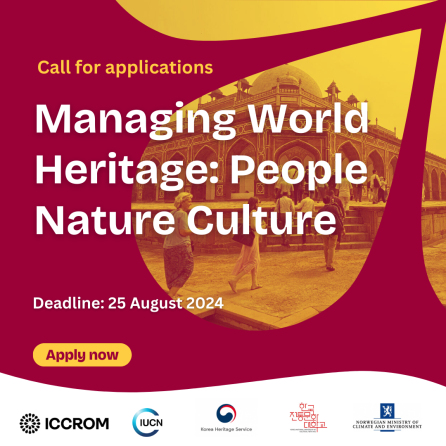Organizers: ICCROM, IUCN, Korea Heritage Service, Korea National University of Cultural Heritage (KNUCH) and the Norwegian Ministry of Climate and Environment.
We are seeking 25 participants to join the next edition of the international course on Managing World Heritage: People, Nature, Culture (PNC24). PNC is the flagship course of the ICCROM-IUCN World Heritage Leadership programme. The next English-language edition will be held in seven online sessions from 27 September to 11 October 2024 (on Mondays, Wednesdays and Fridays).
The course is open to site coordinators, members of management teams and institutions, and heritage practitioners working with World Heritage properties and other heritage places around the world.
Why is this course needed?
PNC courses promote a ‘heritage place approach’ to heritage management focused on understanding how to manage and conserve the multiple heritage values of places in their wider social, environmental and economic contexts. This includes applying a place-based approach to heritage management and people-centred approaches to working with diverse actors and communities.
Participants will learn how effective management can give heritage places a dynamic and mutually beneficial role in society today and long into the future, reflecting the vast array of people who care for, use and enjoy them. Heritage practitioners, community members and networks, and policymakers within institutions are among the contributors to the management, conservation and use of a heritage place. Thus, working with all these groups can be essential for gaining benefits for society and heritage itself. It is important for all relevant actors to be aware of the values that different people associate with a heritage place. They can then collaborate on appropriate approaches and methods to protect these diverse values holistically.
In this course, natural and cultural heritage conservation are seen as interrelated and interdependent, overcoming the artificial separation between the two concepts to promote quality management at World Heritage properties and other heritage places. Engaging actors and communities is still a considerable challenge at many heritage places, while linking nature and culture can have realistic barriers, including separate institutional and legal protection systems. While there is no simple recipe for responding to these challenges, there are many possible approaches to explore and consider adapting elsewhere. It brings together those involved in all facets of heritage management to share their experiences and learn from each other, advancing practice in the field.
What is the content of the course?
The course provides a general overview of what constitutes a heritage management system and tools to assess its effectiveness, recognizing the need to adapt to changing times and realities. By understanding how the system works, it is possible to evaluate how it operates and its performance, including how existing resources can be better utilized while exploring new ways of doing things. During the course, participants will be introduced to key tools and resources for improving management, planning and decision-making processes at World Heritage properties and other heritage places.
The course content is aligned with the content of the forthcoming World Heritage Resource Manual on 'Managing World Heritage’, the recently published Enhancing Our Heritage Toolkit 2.0 and the Operational Guidelines for the Implementation of the World Heritage Convention. All these publications are prepared jointly by UNESCO, ICCROM, ICOMOS and IUCN to support those working with World Heritage.
The course will be structured around seven learning modules that will tackle the following overarching topics:
Heritage place approach
Boundaries, buffer zones and wider context of heritage places
Governance arrangements, including people-centred and rights-based approaches to heritage management
Factors affecting heritage places and their social, economic and environmental context
Management systems
Management planning and implementation
Management effectiveness assessment for heritage places
Heritage conservation and management results
Additionally, the course will draw on experiences and approaches implemented by participants at their World Heritage properties and heritage places, allowing for better understanding of heritage management in the international context and encouraging peer learning and knowledge sharing throughout the course.
Who is the course for?
This course specifically targets:
practitioners working at a specific cultural or natural World Heritage property, or other heritage place;
individuals working in institutions with responsibilities related to managing World Heritage properties and/or other heritage places; and
individuals involved more generally in World Heritage conservation and management (for example, those working in heritage at a regional or national level, policymakers and other representatives of institutions, non-governmental organizations, charities, local associations, community groups, etc.).
Applications are open to all regions and professionals. Applicants from the Caribbean and SID countries fulfilling one or more of the above categories will be prioritized in the selection process.
Course schedule and programme
The course will take place in English and will be fully implemented online. Theoretical and introductory presentations will be uploaded as asynchronous learning materials on the new ICCROM e-learning platform divided into seven learning modules. Participants will access these materials in advance so that they are familiar with the content and can fully engage in discussions and exercises during the live sessions.
Each learning module will be complemented with an instructor-led live session on Zoom that will take place on the following dates:
Friday, 27 September 2024
Monday, 30 September 2024
Wednesday, 2 October 2024
Friday, 4 October 2024
Monday, 7 October 2024
Wednesday, 9 October 2024
Friday, 11 October 2024
During live sessions, participants will be required to contribute actively in three-hour online sessions from 13.00 to 16.00 Central European Time.
How to apply for the PNC24 course
Please submit your application by 25 August 2024.
The application process is as follows:
complete the online application form in English
upload a personal photo
upload a brief version of your professional curriculum vitae highlighting your most relevant experience (in English; maximum two pages)
upload the official endorsement of your institution, which confirms that you have the support of your workplace for taking the time to complete the entire course.
Allowed formats: pdf, doc, docx, jpg, jpeg, png, tif, tiff; maximum file size 5 MB.
If you encounter any issues submitting your application via the ICCROM website, please email us at: whl@iccrom.org.

